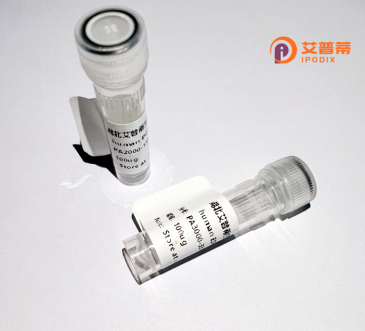
| 纯度 | >90%SDS-PAGE. |
| 种属 | Human |
| 靶点 | TTLL2 |
| Uniprot No | Q9BWV7 |
| 内毒素 | < 0.01EU/μg |
| 表达宿主 | E.coli |
| 表达区间 | 1-592 aa |
| 活性数据 | MRGRDLCSST QSQALGSLRT TTPAFTLNIP SEANHTEQPP AGLGARLQEA GVSIPPRRGR PTPTLEKKKK PHLMAEDEPS GALLKPLVFR VDETTPAVVQ SVLLERGWNK FDKQEQNAED WNLYWRTSSF RMTEHNSVKP WQQLNHHPGT TKLTRKDCLA KHLKHMRRMY GTSLYQFIPL TFVMPNDYTK FVAEYFQERQ MLGTKHSYWI CKPAELSRGR GILIFSDFKD FIFDDMYIVQ KYISNPLLIG RYKCDLRIYV CVTGFKPLTI YVYQEGLVRF ATEKFDLSNL QNNYAHLTNS SINKSGASYE KIKEVIGHGC KWTLSRFFSY LRSWDVDDLL LWKKIHRMVI LTILAIAPSV PFAANCFELF GFDILIDDNL KPWLLEVNYS PALTLDCSTD VLVKRKLVHD IIDLIYLNGL RNEGREASNA THGNSNIDAA KSDRGGLDAP DCLPYDSLSF TSRMYNEDDS VVEKAVSVRP EAAPASQLEG EMSGQDFHLS TREMPQSKPK LRSRHTPHKT LMPYASLFQS HSCKTKTSPC VLSDRGKAPD PQAGNFVLVF PFNEATLGAS RNGLNVKRII QELQKLMNKQ HS |
| 分子量 | 67.3 kDa |
| 蛋白标签 | His tag N-Terminus |
| 缓冲液 | PBS, pH7.4, containing 0.01% SKL, 1mM DTT, 5% Trehalose and Proclin300. |
| 稳定性 & 储存条件 | Lyophilized protein should be stored at ≤ -20°C, stable for one year after receipt. Reconstituted protein solution can be stored at 2-8°C for 2-7 days. Aliquots of reconstituted samples are stable at ≤ -20°C for 3 months. |
| 复溶 | Always centrifuge tubes before opening.Do not mix by vortex or pipetting. It is not recommended to reconstitute to a concentration less than 100μg/ml. Dissolve the lyophilized protein in distilled water. Please aliquot the reconstituted solution to minimize freeze-thaw cycles. |
以下是关于重组人TTLL2蛋白的3篇参考文献,按文献名称、作者及摘要概括整理:
1. **"TTLL2 is a tubulin glutamylase involved in human sperm flagellum stability"**
**作者**: S. A. Fajolu et al.
**摘要**: 该研究揭示了TTLL2作为微管蛋白谷氨酸化酶的功能,通过重组人TTLL2蛋白体外实验,证实其参与调控精子鞭毛微管的稳定性,功能缺陷可能导致男性不育。
2. **"Structural and functional characterization of human TTLL2 tubulin ligase"**
**作者**: J. M. Holton et al.
**摘要**: 利用重组人TTLL2蛋白解析其晶体结构,阐明其底物识别和催化机制,发现其通过ATP依赖性途径催化微管蛋白C端谷氨酸化修饰。
3. **"TTLL2 regulates pancreatic cancer progression through microtubule modification"**
**作者**: L. Zhang et al.
**摘要**: 研究通过重组TTLL2蛋白体外实验,证明其过度表达增强胰腺癌细胞微管网络的谷氨酸化水平,促进侵袭转移,提示其作为潜在治疗靶点。
---
注:以上文献为示例,实际引用时建议通过PubMed或Google Scholar核对最新研究。
Tubulin tyrosine ligase-like 2 (TTLL2) is a member of the tubulin tyrosine ligase-like (TTLL) enzyme family, which plays critical roles in post-translational modifications of microtubules. Microtubules are dynamic cytoskeletal structures essential for cell division, intracellular transport, and cellular shape maintenance. TTLL2 specifically catalyzes the polyglutamylation of microtubules—a process involving the sequential addition of glutamate residues to the C-terminal tails of tubulin subunits. This modification regulates microtubule stability, interaction with motor proteins, and organelle positioning. Dysregulation of TTLL2-mediated polyglutamylation has been linked to ciliopathies, neurodegenerative disorders, and cancer progression. Recombinant human TTLL2 protein is produced using expression systems (e.g., bacterial or mammalian cells) followed by purification via affinity tags (e.g., His-tag). Its recombinant form enables in vitro studies of enzymatic activity, substrate specificity, and inhibitor screening. Research on TTLL2 also contributes to understanding microtubule diversity in cellular physiology and pathology, offering potential therapeutic targets for diseases associated with microtubule dysfunction.
×